Case Study: Karan v Minister of Immigration and Border Protection
VerifiedAdded on 2022/08/18
|6
|1323
|13
Case Study
AI Summary
This case study analyzes the legal proceedings of Karan v Minister of Immigration and Border Protection, a matter concerning a visa denial and subsequent appeal. The appellant, a Fijian citizen, applied for a visitor's visa to Australia in 2000 and later sought a waiver to remain in the country after marrying an Australian citizen. The Minister denied the waiver based on visa conditions under the Migration Act 1958 and Regulations. Karan appealed, citing emotional support from his pregnant wife as a compelling reason, but the delegate initially dismissed the application, failing to recognize compelling circumstances. The appeal judge, however, found that the delegate erred by not adequately considering all relevant submissions, particularly the wife's medical and psychological condition, and the potential emotional distress caused by separation. The judge highlighted the importance of considering the reasons behind the waiver application and the impact of separation on the wife's mental health. The appeal was upheld, overturning the initial decision and ordering the respondent to cover the appellant's costs.
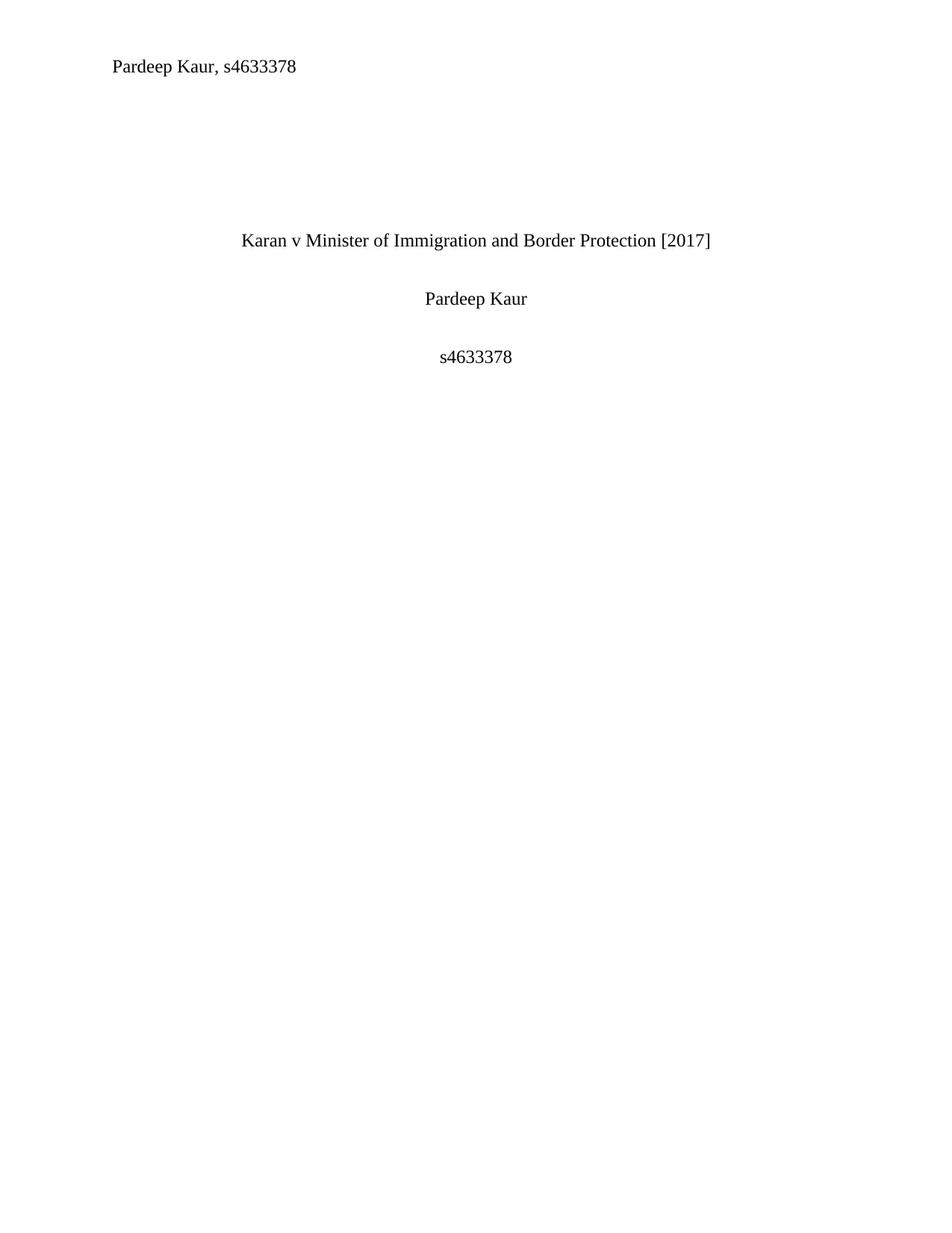
Pardeep Kaur, s4633378
Karan v Minister of Immigration and Border Protection [2017]
Pardeep Kaur
s4633378
Karan v Minister of Immigration and Border Protection [2017]
Pardeep Kaur
s4633378
Paraphrase This Document
Need a fresh take? Get an instant paraphrase of this document with our AI Paraphraser
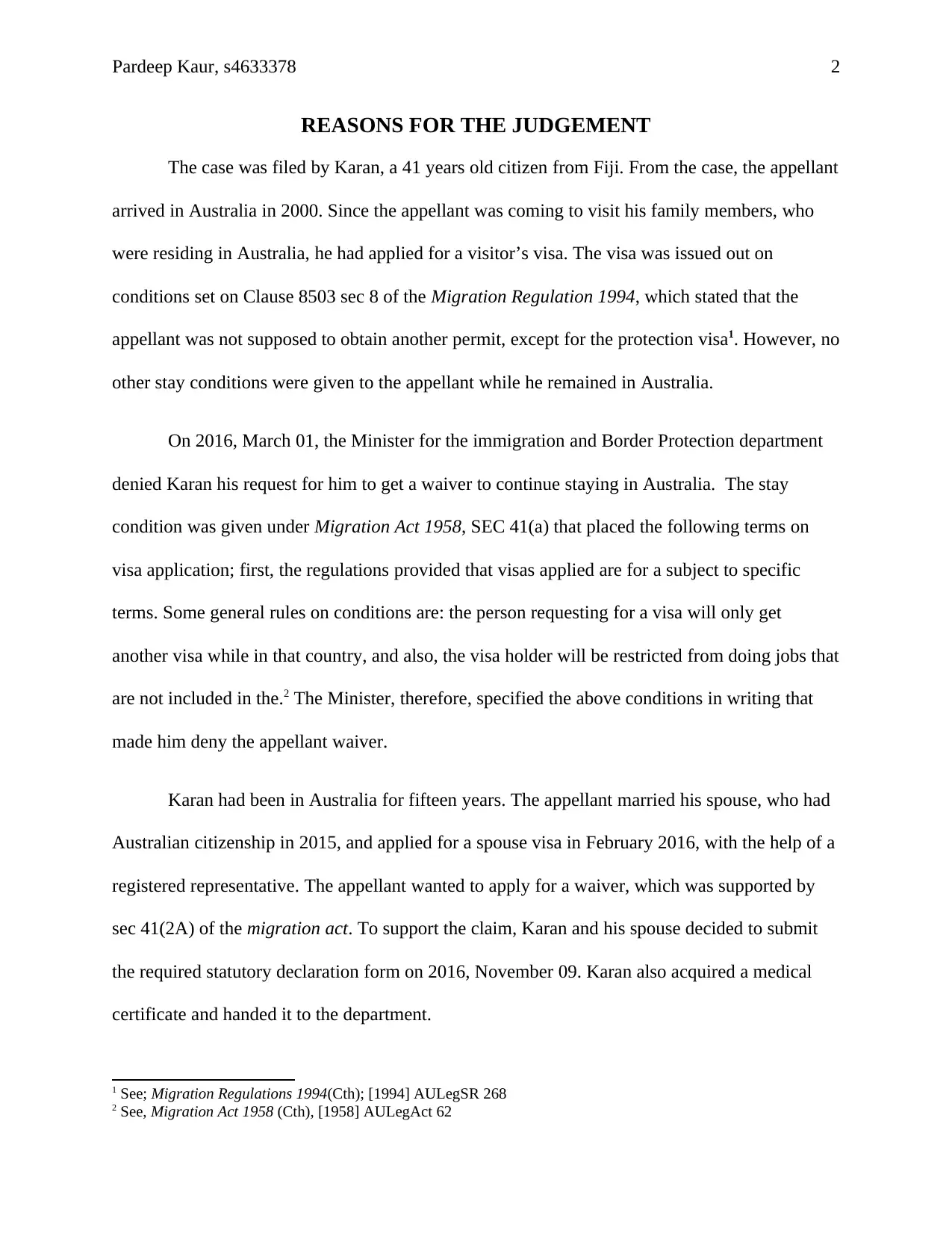
Pardeep Kaur, s4633378 2
REASONS FOR THE JUDGEMENT
The case was filed by Karan, a 41 years old citizen from Fiji. From the case, the appellant
arrived in Australia in 2000. Since the appellant was coming to visit his family members, who
were residing in Australia, he had applied for a visitor’s visa. The visa was issued out on
conditions set on Clause 8503 sec 8 of the Migration Regulation 1994, which stated that the
appellant was not supposed to obtain another permit, except for the protection visa1. However, no
other stay conditions were given to the appellant while he remained in Australia.
On 2016, March 01, the Minister for the immigration and Border Protection department
denied Karan his request for him to get a waiver to continue staying in Australia. The stay
condition was given under Migration Act 1958, SEC 41(a) that placed the following terms on
visa application; first, the regulations provided that visas applied are for a subject to specific
terms. Some general rules on conditions are: the person requesting for a visa will only get
another visa while in that country, and also, the visa holder will be restricted from doing jobs that
are not included in the.2 The Minister, therefore, specified the above conditions in writing that
made him deny the appellant waiver.
Karan had been in Australia for fifteen years. The appellant married his spouse, who had
Australian citizenship in 2015, and applied for a spouse visa in February 2016, with the help of a
registered representative. The appellant wanted to apply for a waiver, which was supported by
sec 41(2A) of the migration act. To support the claim, Karan and his spouse decided to submit
the required statutory declaration form on 2016, November 09. Karan also acquired a medical
certificate and handed it to the department.
1 See; Migration Regulations 1994(Cth); [1994] AULegSR 268
2 See, Migration Act 1958 (Cth), [1958] AULegAct 62
REASONS FOR THE JUDGEMENT
The case was filed by Karan, a 41 years old citizen from Fiji. From the case, the appellant
arrived in Australia in 2000. Since the appellant was coming to visit his family members, who
were residing in Australia, he had applied for a visitor’s visa. The visa was issued out on
conditions set on Clause 8503 sec 8 of the Migration Regulation 1994, which stated that the
appellant was not supposed to obtain another permit, except for the protection visa1. However, no
other stay conditions were given to the appellant while he remained in Australia.
On 2016, March 01, the Minister for the immigration and Border Protection department
denied Karan his request for him to get a waiver to continue staying in Australia. The stay
condition was given under Migration Act 1958, SEC 41(a) that placed the following terms on
visa application; first, the regulations provided that visas applied are for a subject to specific
terms. Some general rules on conditions are: the person requesting for a visa will only get
another visa while in that country, and also, the visa holder will be restricted from doing jobs that
are not included in the.2 The Minister, therefore, specified the above conditions in writing that
made him deny the appellant waiver.
Karan had been in Australia for fifteen years. The appellant married his spouse, who had
Australian citizenship in 2015, and applied for a spouse visa in February 2016, with the help of a
registered representative. The appellant wanted to apply for a waiver, which was supported by
sec 41(2A) of the migration act. To support the claim, Karan and his spouse decided to submit
the required statutory declaration form on 2016, November 09. Karan also acquired a medical
certificate and handed it to the department.
1 See; Migration Regulations 1994(Cth); [1994] AULegSR 268
2 See, Migration Act 1958 (Cth), [1958] AULegAct 62
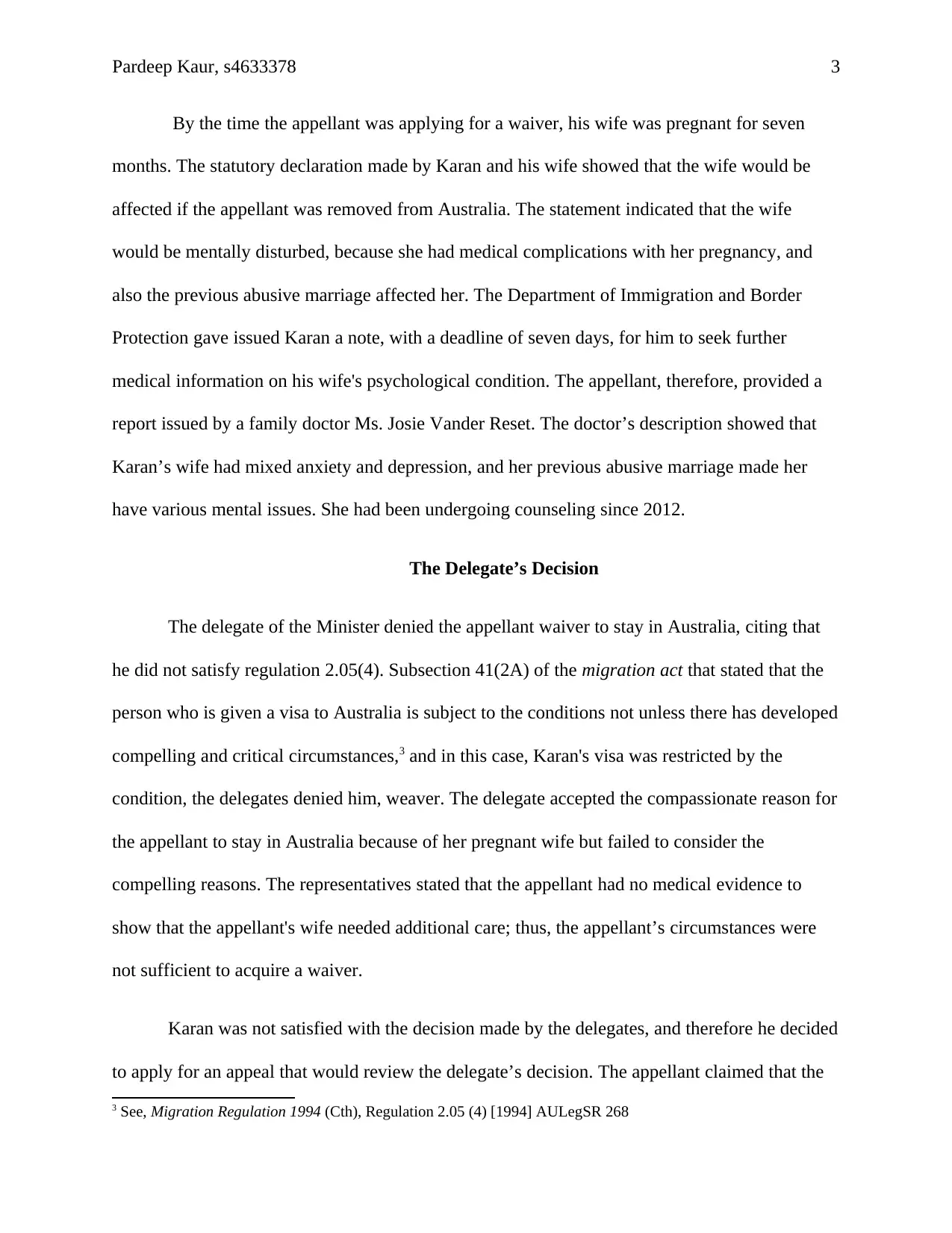
Pardeep Kaur, s4633378 3
By the time the appellant was applying for a waiver, his wife was pregnant for seven
months. The statutory declaration made by Karan and his wife showed that the wife would be
affected if the appellant was removed from Australia. The statement indicated that the wife
would be mentally disturbed, because she had medical complications with her pregnancy, and
also the previous abusive marriage affected her. The Department of Immigration and Border
Protection gave issued Karan a note, with a deadline of seven days, for him to seek further
medical information on his wife's psychological condition. The appellant, therefore, provided a
report issued by a family doctor Ms. Josie Vander Reset. The doctor’s description showed that
Karan’s wife had mixed anxiety and depression, and her previous abusive marriage made her
have various mental issues. She had been undergoing counseling since 2012.
The Delegate’s Decision
The delegate of the Minister denied the appellant waiver to stay in Australia, citing that
he did not satisfy regulation 2.05(4). Subsection 41(2A) of the migration act that stated that the
person who is given a visa to Australia is subject to the conditions not unless there has developed
compelling and critical circumstances,3 and in this case, Karan's visa was restricted by the
condition, the delegates denied him, weaver. The delegate accepted the compassionate reason for
the appellant to stay in Australia because of her pregnant wife but failed to consider the
compelling reasons. The representatives stated that the appellant had no medical evidence to
show that the appellant's wife needed additional care; thus, the appellant’s circumstances were
not sufficient to acquire a waiver.
Karan was not satisfied with the decision made by the delegates, and therefore he decided
to apply for an appeal that would review the delegate’s decision. The appellant claimed that the
3 See, Migration Regulation 1994 (Cth), Regulation 2.05 (4) [1994] AULegSR 268
By the time the appellant was applying for a waiver, his wife was pregnant for seven
months. The statutory declaration made by Karan and his wife showed that the wife would be
affected if the appellant was removed from Australia. The statement indicated that the wife
would be mentally disturbed, because she had medical complications with her pregnancy, and
also the previous abusive marriage affected her. The Department of Immigration and Border
Protection gave issued Karan a note, with a deadline of seven days, for him to seek further
medical information on his wife's psychological condition. The appellant, therefore, provided a
report issued by a family doctor Ms. Josie Vander Reset. The doctor’s description showed that
Karan’s wife had mixed anxiety and depression, and her previous abusive marriage made her
have various mental issues. She had been undergoing counseling since 2012.
The Delegate’s Decision
The delegate of the Minister denied the appellant waiver to stay in Australia, citing that
he did not satisfy regulation 2.05(4). Subsection 41(2A) of the migration act that stated that the
person who is given a visa to Australia is subject to the conditions not unless there has developed
compelling and critical circumstances,3 and in this case, Karan's visa was restricted by the
condition, the delegates denied him, weaver. The delegate accepted the compassionate reason for
the appellant to stay in Australia because of her pregnant wife but failed to consider the
compelling reasons. The representatives stated that the appellant had no medical evidence to
show that the appellant's wife needed additional care; thus, the appellant’s circumstances were
not sufficient to acquire a waiver.
Karan was not satisfied with the decision made by the delegates, and therefore he decided
to apply for an appeal that would review the delegate’s decision. The appellant claimed that the
3 See, Migration Regulation 1994 (Cth), Regulation 2.05 (4) [1994] AULegSR 268
⊘ This is a preview!⊘
Do you want full access?
Subscribe today to unlock all pages.

Trusted by 1+ million students worldwide
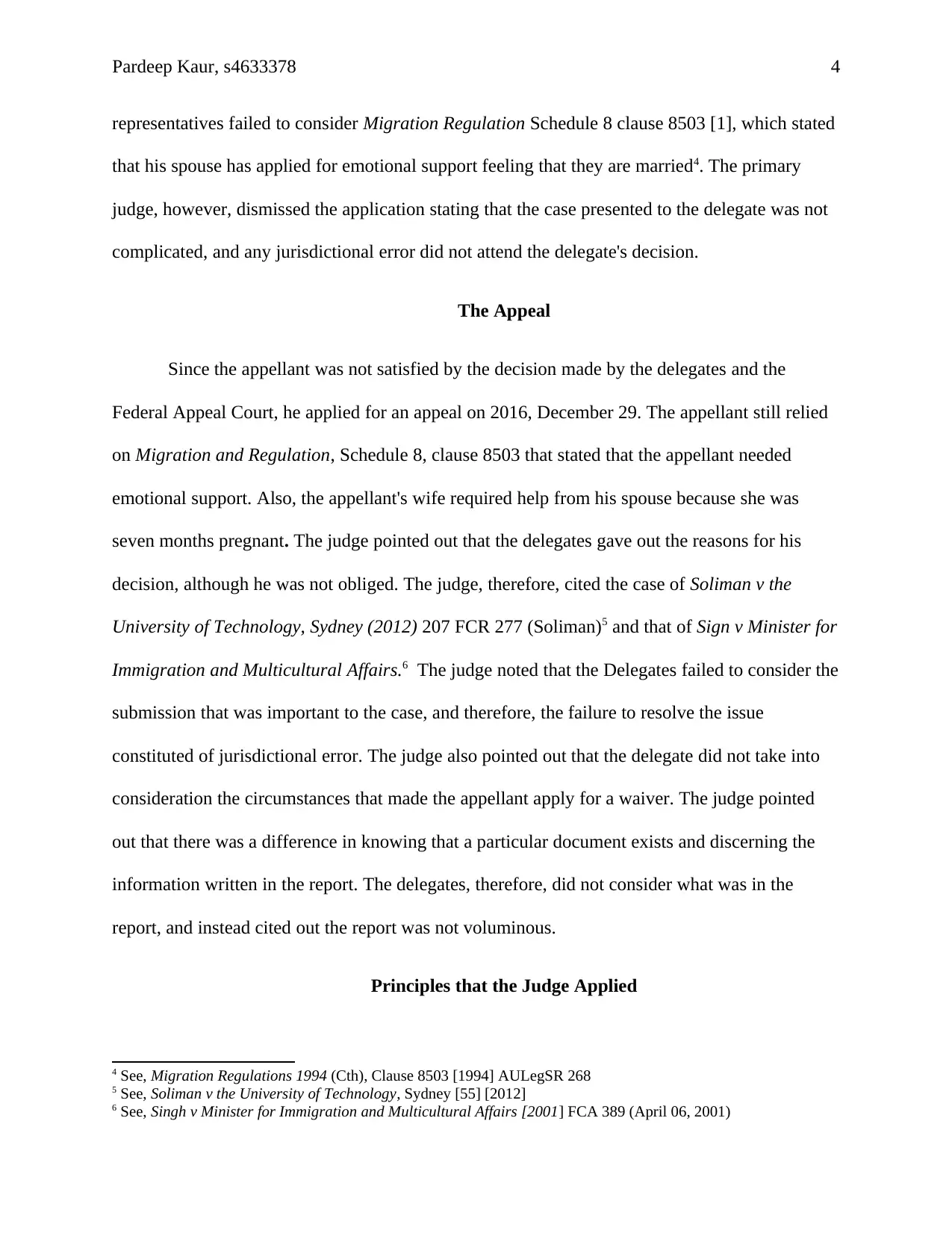
Pardeep Kaur, s4633378 4
representatives failed to consider Migration Regulation Schedule 8 clause 8503 [1], which stated
that his spouse has applied for emotional support feeling that they are married4. The primary
judge, however, dismissed the application stating that the case presented to the delegate was not
complicated, and any jurisdictional error did not attend the delegate's decision.
The Appeal
Since the appellant was not satisfied by the decision made by the delegates and the
Federal Appeal Court, he applied for an appeal on 2016, December 29. The appellant still relied
on Migration and Regulation, Schedule 8, clause 8503 that stated that the appellant needed
emotional support. Also, the appellant's wife required help from his spouse because she was
seven months pregnant. The judge pointed out that the delegates gave out the reasons for his
decision, although he was not obliged. The judge, therefore, cited the case of Soliman v the
University of Technology, Sydney (2012) 207 FCR 277 (Soliman)5 and that of Sign v Minister for
Immigration and Multicultural Affairs.6 The judge noted that the Delegates failed to consider the
submission that was important to the case, and therefore, the failure to resolve the issue
constituted of jurisdictional error. The judge also pointed out that the delegate did not take into
consideration the circumstances that made the appellant apply for a waiver. The judge pointed
out that there was a difference in knowing that a particular document exists and discerning the
information written in the report. The delegates, therefore, did not consider what was in the
report, and instead cited out the report was not voluminous.
Principles that the Judge Applied
4 See, Migration Regulations 1994 (Cth), Clause 8503 [1994] AULegSR 268
5 See, Soliman v the University of Technology, Sydney [55] [2012]
6 See, Singh v Minister for Immigration and Multicultural Affairs [2001] FCA 389 (April 06, 2001)
representatives failed to consider Migration Regulation Schedule 8 clause 8503 [1], which stated
that his spouse has applied for emotional support feeling that they are married4. The primary
judge, however, dismissed the application stating that the case presented to the delegate was not
complicated, and any jurisdictional error did not attend the delegate's decision.
The Appeal
Since the appellant was not satisfied by the decision made by the delegates and the
Federal Appeal Court, he applied for an appeal on 2016, December 29. The appellant still relied
on Migration and Regulation, Schedule 8, clause 8503 that stated that the appellant needed
emotional support. Also, the appellant's wife required help from his spouse because she was
seven months pregnant. The judge pointed out that the delegates gave out the reasons for his
decision, although he was not obliged. The judge, therefore, cited the case of Soliman v the
University of Technology, Sydney (2012) 207 FCR 277 (Soliman)5 and that of Sign v Minister for
Immigration and Multicultural Affairs.6 The judge noted that the Delegates failed to consider the
submission that was important to the case, and therefore, the failure to resolve the issue
constituted of jurisdictional error. The judge also pointed out that the delegate did not take into
consideration the circumstances that made the appellant apply for a waiver. The judge pointed
out that there was a difference in knowing that a particular document exists and discerning the
information written in the report. The delegates, therefore, did not consider what was in the
report, and instead cited out the report was not voluminous.
Principles that the Judge Applied
4 See, Migration Regulations 1994 (Cth), Clause 8503 [1994] AULegSR 268
5 See, Soliman v the University of Technology, Sydney [55] [2012]
6 See, Singh v Minister for Immigration and Multicultural Affairs [2001] FCA 389 (April 06, 2001)
Paraphrase This Document
Need a fresh take? Get an instant paraphrase of this document with our AI Paraphraser
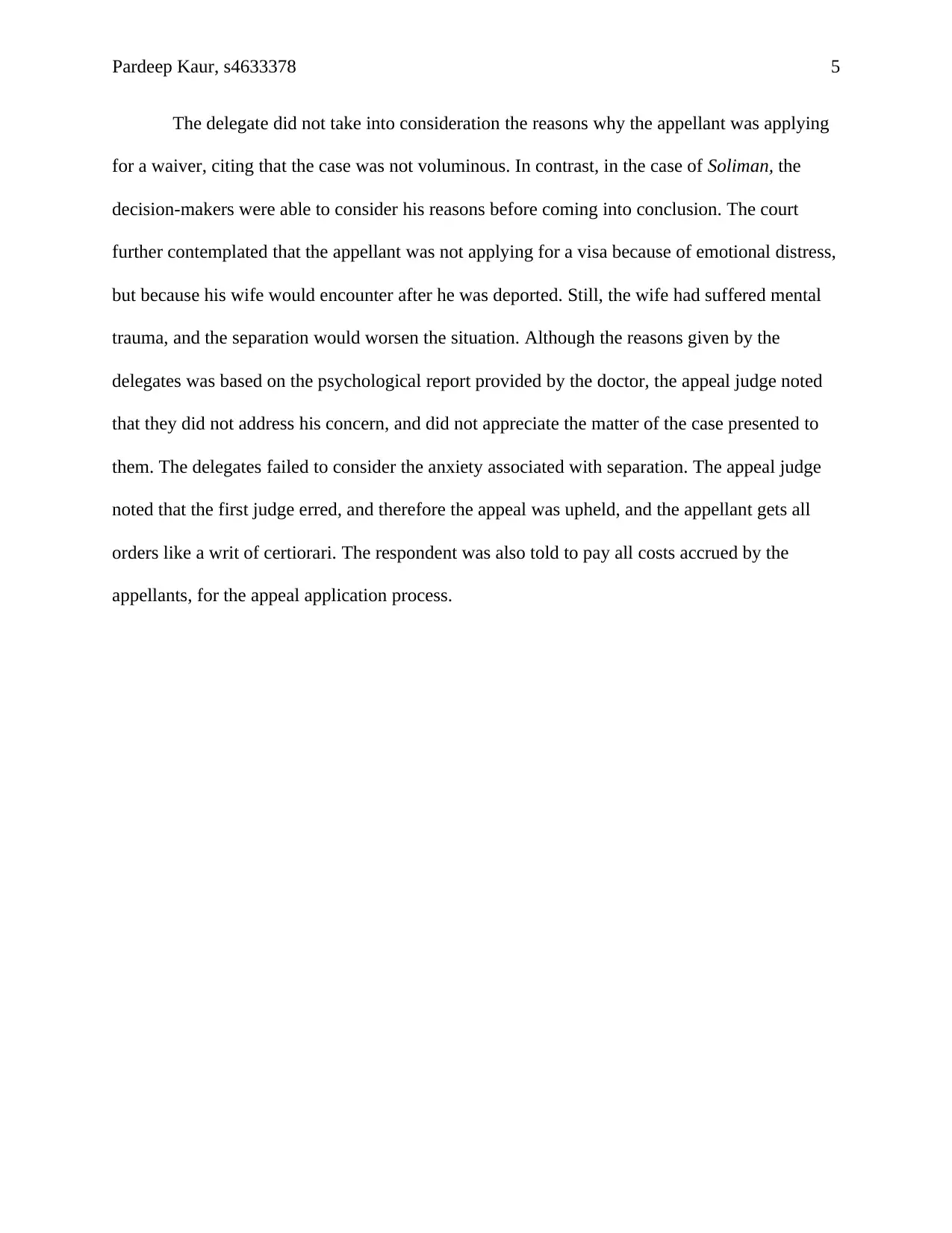
Pardeep Kaur, s4633378 5
The delegate did not take into consideration the reasons why the appellant was applying
for a waiver, citing that the case was not voluminous. In contrast, in the case of Soliman, the
decision-makers were able to consider his reasons before coming into conclusion. The court
further contemplated that the appellant was not applying for a visa because of emotional distress,
but because his wife would encounter after he was deported. Still, the wife had suffered mental
trauma, and the separation would worsen the situation. Although the reasons given by the
delegates was based on the psychological report provided by the doctor, the appeal judge noted
that they did not address his concern, and did not appreciate the matter of the case presented to
them. The delegates failed to consider the anxiety associated with separation. The appeal judge
noted that the first judge erred, and therefore the appeal was upheld, and the appellant gets all
orders like a writ of certiorari. The respondent was also told to pay all costs accrued by the
appellants, for the appeal application process.
The delegate did not take into consideration the reasons why the appellant was applying
for a waiver, citing that the case was not voluminous. In contrast, in the case of Soliman, the
decision-makers were able to consider his reasons before coming into conclusion. The court
further contemplated that the appellant was not applying for a visa because of emotional distress,
but because his wife would encounter after he was deported. Still, the wife had suffered mental
trauma, and the separation would worsen the situation. Although the reasons given by the
delegates was based on the psychological report provided by the doctor, the appeal judge noted
that they did not address his concern, and did not appreciate the matter of the case presented to
them. The delegates failed to consider the anxiety associated with separation. The appeal judge
noted that the first judge erred, and therefore the appeal was upheld, and the appellant gets all
orders like a writ of certiorari. The respondent was also told to pay all costs accrued by the
appellants, for the appeal application process.
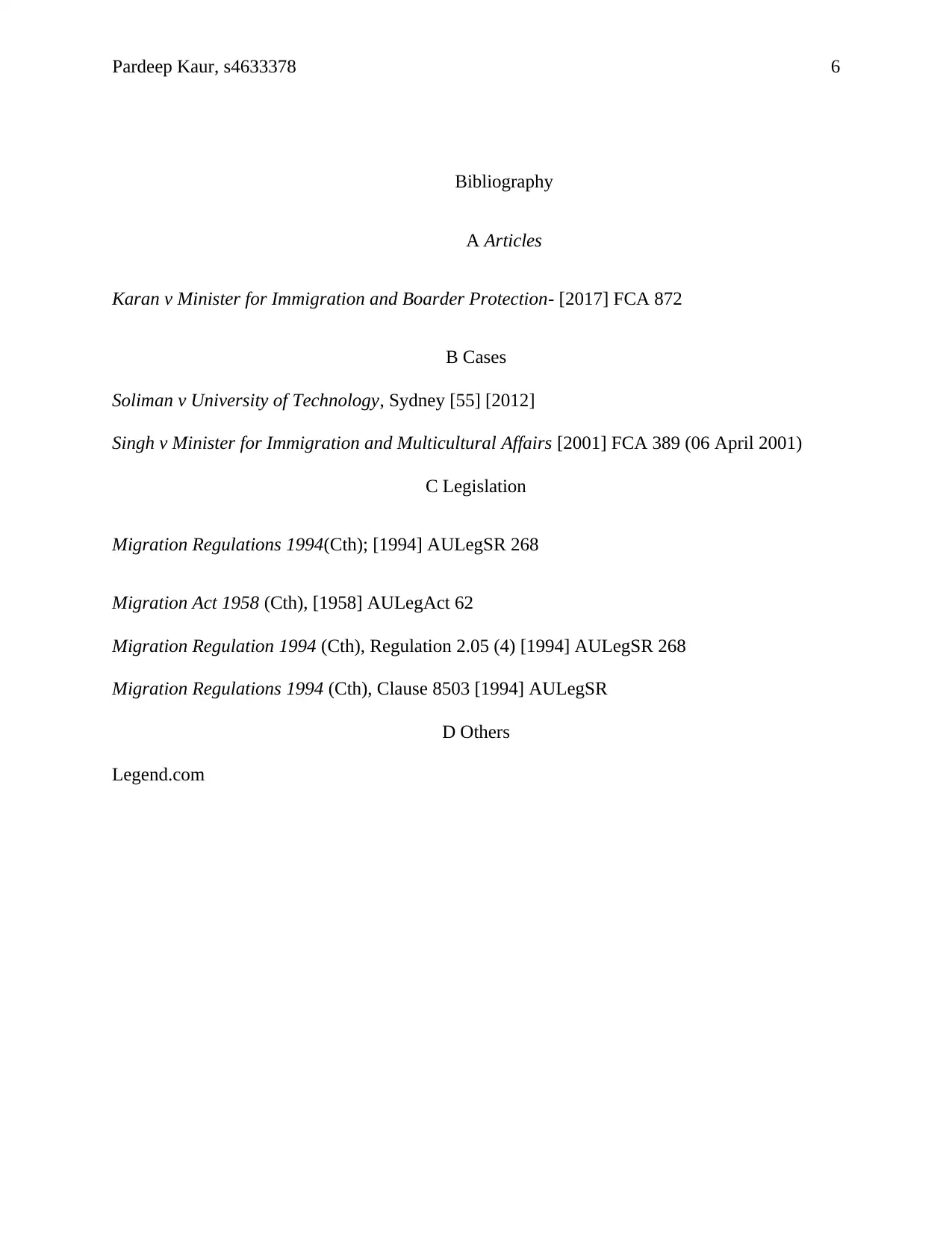
Pardeep Kaur, s4633378 6
Bibliography
A Articles
Karan v Minister for Immigration and Boarder Protection- [2017] FCA 872
B Cases
Soliman v University of Technology, Sydney [55] [2012]
Singh v Minister for Immigration and Multicultural Affairs [2001] FCA 389 (06 April 2001)
C Legislation
Migration Regulations 1994(Cth); [1994] AULegSR 268
Migration Act 1958 (Cth), [1958] AULegAct 62
Migration Regulation 1994 (Cth), Regulation 2.05 (4) [1994] AULegSR 268
Migration Regulations 1994 (Cth), Clause 8503 [1994] AULegSR
D Others
Legend.com
Bibliography
A Articles
Karan v Minister for Immigration and Boarder Protection- [2017] FCA 872
B Cases
Soliman v University of Technology, Sydney [55] [2012]
Singh v Minister for Immigration and Multicultural Affairs [2001] FCA 389 (06 April 2001)
C Legislation
Migration Regulations 1994(Cth); [1994] AULegSR 268
Migration Act 1958 (Cth), [1958] AULegAct 62
Migration Regulation 1994 (Cth), Regulation 2.05 (4) [1994] AULegSR 268
Migration Regulations 1994 (Cth), Clause 8503 [1994] AULegSR
D Others
Legend.com
⊘ This is a preview!⊘
Do you want full access?
Subscribe today to unlock all pages.

Trusted by 1+ million students worldwide
1 out of 6
Related Documents
Your All-in-One AI-Powered Toolkit for Academic Success.
+13062052269
info@desklib.com
Available 24*7 on WhatsApp / Email
![[object Object]](/_next/static/media/star-bottom.7253800d.svg)
Unlock your academic potential
Copyright © 2020–2026 A2Z Services. All Rights Reserved. Developed and managed by ZUCOL.


![Implications of Le v Minister for Immigration [2019] FCCA 2167](/_next/image/?url=https%3A%2F%2Fdesklib.com%2Fmedia%2Fimages%2Fyq%2F3867d1a1ba4b437ba61ecfd169b6d5a2.jpg&w=256&q=75)


